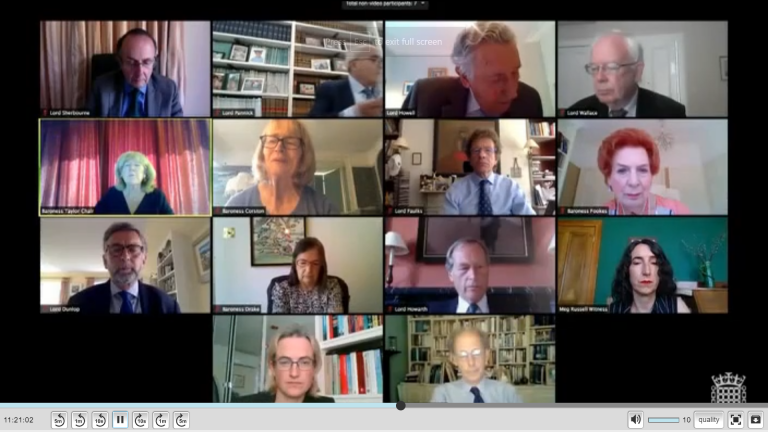Meg Russell gives evidence to House of Lords Constitution Committee
24 June 2020
Professor Meg Russell gave evidence to the Lords Constitution Committee on 24 June as part of their ‘constitutional implications of Covid-19’ inquiry.

Professor Russell gave evidence about parliament’s workings during the pandemic, alongside Dr Hannah White of the Institute for Government and Sir David Natzler, former Clerk of the House of Commons and Honorary Senior Research Associate at the Unit. Earlier in the same session, the Committee heard evidence from Baroness Smith of Basildon and Lord Newby, respectively the Labour and Liberal Democrat Leaders in the House of Lords.
Key points from Meg Russell’s evidence included the following:
- The UK parliament was initially a world leader in the speed and success of its movement to hybrid and virtual proceedings. But whilst the House of Lords has continued to build on that success, the Commons went rapidly and somewhat chaotically backward as a result of the government’s actions in seeking to end the hybrid parliament.
- Any decisions about parliament’s workings during the pandemic need to be underpinned by the fundamental principle of equal participation. Virtual or hybrid working is not ideal – it makes it hard for parliamentarians to read the room, limits spontaneity, and leaves little space for the informal interactions crucial to Westminster’s day-to-day workings. But none of these shortcomings are enough to justify ending the system of remote participation, if that conflicts with the basic parliamentary and democratic principle of equal participation.
- All around the world, parliaments have faced difficult procedural decisions about managing the crisis. These should be made in an inclusive, cross-party way, taking account of backbenchers’ views as well as those of government and party leaders. The House of Lords has achieved this better than the Commons, in line with its general cross-party ethos. In the Commons, decision-making was initially consensual (facilitated partly through the House of Commons Commission), but recent weeks have highlighted the extent of the government’s control, leading to a vote on 2 June on the continuation of hybrid proceedings which excluded more than 200 MPs. This moved us from being a world leader to an international bad example. The extent of the government’s control over the Commons agenda and procedures now needs urgent review.
- Good parliamentary scrutiny of the government’s response to the pandemic depends on government engagement. The daily Downing Street press conferences have led to concerns that policy has been announced outside parliament, with inadequate scrutiny in parliament. Legislative changes to handle the pandemic have often been achieved via ‘made negative’ statutory instruments at short notice, meaning that they come into effect before MPs and peers have a chance to comment (as catalogued by the Hansard Society). A recent example was the quarantine regulation for overseas arrivals. Despite being mooted for some time, and known to be of concern to many Conservative MPs, they got no formal say. Wise governments should view parliament as a friend – scrutiny, requiring ministers to explain and defend their policy in a public setting, generally makes for better policy.
- Looking ahead, parliament should think carefully about which if any of the recent innovations it wants to keep. There may, for example, be good arguments in favour of keeping some virtual participation – particularly in committees. But there could also be unintended consequences. In the Commons, this could encourage MPs to become even more constituency-focused. In the Lords, online voting seems to be changing the dynamic, with much higher levels of participation than usual. In both chambers, if some members participated largely remotely, this could result in two classes of member, one of which is excluded from vital informal discussions and networks. Parliament should therefore think through the consequences carefully before it commits to any longer-lasting changes.
Evidence in full:
Key links:
- Constitutional implications of Covid-19 inquiry
- Meg Russell and Ruth Fox’s ‘Proposals for a virtual parliament’, on the Unit blog
- An open letter to Leader of the House Jacob Rees-Mogg about the ending of the hybrid Commons, from a group of democracy experts including Meg Russell
- Sir David Natzler’s blog posts for the Unit on parliament and coronavirus
- The Unit’s research on parliament
 Close
Close

